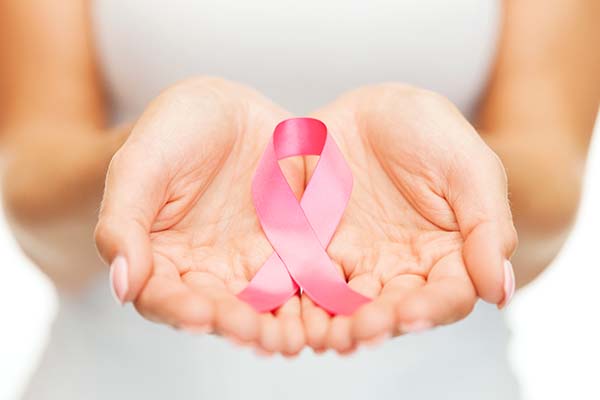Breast Cancer Awareness Month: Risk Factors, Symptoms, and How to Get Involved

October is breast cancer awareness month, which indicates a time to ensure you are aware of the risk factors of breast cancer, the common symptoms that indicate breast cancer has developed, and perhaps get involved to help spread breast cancer awareness.
By having an understanding of breast cancer and spreading the importance of knowing the signs and getting screened, you can help yourself and others seek proper, prompt treatment in the event breast cancer develops.
Breast cancer awareness
Certain factors put certain individuals at an increased risk of developing breast cancer. With that said, it is still essential for everyone, particularly women, to understand the most common symptoms of breast cancer. The following is everything you need to know about breast cancer awareness.
Risk factors
The most obvious risk factor of breast cancer is being a woman, although breast cancer can exist in men as well. Along with being a woman, there are various other breast cancer risk factors:
- Increasing age
- Family history of breast cancer
- Previous breast conditions
- Exposure to radiation
- Obesity
While breast cancer can develop at a young age, the chance of developing breast cancer seems to increase as we age. Additionally, there is an increased risk of developing breast cancer if someone in your family has had breast cancer in the past.
Also, anyone who has had previous breast conditions and concerns may be at an increased risk as well, along with anyone who has been exposed to radiation or is obese.
Symptoms
Regardless of whether or not you are at an increased risk, it is essential to check for the signs of breast cancer every so often. The most common symptoms of breast cancer include:
- Lump or thickening on the breast
- Change in the appearance of the breast
- Skin issues involving the breast area
- A recently developed inverted nipple
The most common symptom of breast cancer, which is fortunately relatively easy to check for, is a lump that has formed on the breast. The bump often feels different than the breast area itself.
Also, any change to the appearance of the breast, including the size and shape, may be a cause for concern, along with any skin or nipple changes that may exist as well.
How to get involved
There are several ways to get involved in breast cancer awareness during October (or any time during the year). The easiest and quickest way to show your support for breast cancer awareness is to make a donation, which can help honor a survivor or aid in one’s fight to beat breast cancer. Another quick, easy way to support breast cancer awareness is to post on social media, alerting others to do all they can to show their support for breast cancer awareness as well.
For anyone who wants to get even more involved, consider organizing a fundraiser or volunteering to help others. There is not a donation or gesture too small, so be sure to get involved in any manner you can to help support breast cancer awareness.
What is breast cancer screening?
Breast cancer screening, also called mammography, is the assessment for signs of breast cancer. This involves a physical examination of the breasts for signs of cancer (e.g., hard lumps or abnormalities). X-rays are often ordered as well to check for signs that cannot be detected by a physical examination alone.
What is the goal of breast cancer screening?
Screenings are for patients who are healthy and have not been diagnosed with breast cancer. The goal is to detect the warning signs and early symptoms of breast cancer to allow for the earliest intervention possible. The process is non-invasive, quick, and almost always covered by insurance.
How often are breast cancer screenings recommended?
Breast cancer screenings are recommended annually for those who are at the highest risk, including all women over the age of 50. Women who are under 50 years of age should discuss their needs with a healthcare provider. If any symptoms are noticed at home, then it is important to schedule a visit for a screening even if the last screening took place within the past year.
Schedule a breast cancer screening today
Here at our practice, we offer breast cancer screenings. If it is time for your next breast cancer screening or if you have symptoms that may indicate a potential concern, then we encourage you to call or send us a message now and find a convenient time to visit with our friendly and professional team.
Get more information here: https://lindenbergcancer.com or call Lindenberg Cancer & Hematology Center at (856) 475-0876
Check out what others are saying about our services on Yelp: Breast Cancer Awareness in Marlton, NJ.
Recent Posts
Blood clot disorders include a spectrum of inherited or acquired conditions that disrupt healthy circulation, elevate the risk of blockage, and threaten vital organs. An oncologist frequently monitors patients for clotting complications because cancer, certain chemotherapies, and reduced mobility intensify thrombotic tendencies. Early recognition of warning signs, together with prompt intervention, significantly lowers the possibility…
Lung cancer treatment has advanced significantly in recent years, allowing for more personalized approaches that improve outcomes and reduce unnecessary side effects. Personalized lung cancer treatment plans are developed based on several factors, including the type and stage of cancer, genetic markers, overall health, and the patient's unique response to specific therapies. These tailored strategies…
An ovarian cancer diagnosis can be scary, as this form of cancer often develops without noticeable symptoms in the early stages. As the disease progresses, it can become more difficult to treat, making early awareness important. Knowing the signs, understanding the diagnostic process, and learning about treatment options from an oncologist can offer patients hope…
Gynecological cancer treatments target cancers that affect the female reproductive organs, such as ovarian, uterine, cervical, vaginal, and vulvar cancers. Fortunately, there have been significant medical advances in cancer treatment that have greatly improved patient outcomes, allowing oncologists to adjust therapies to fit each patient's needs and overall health. These targeted treatments work better than…


